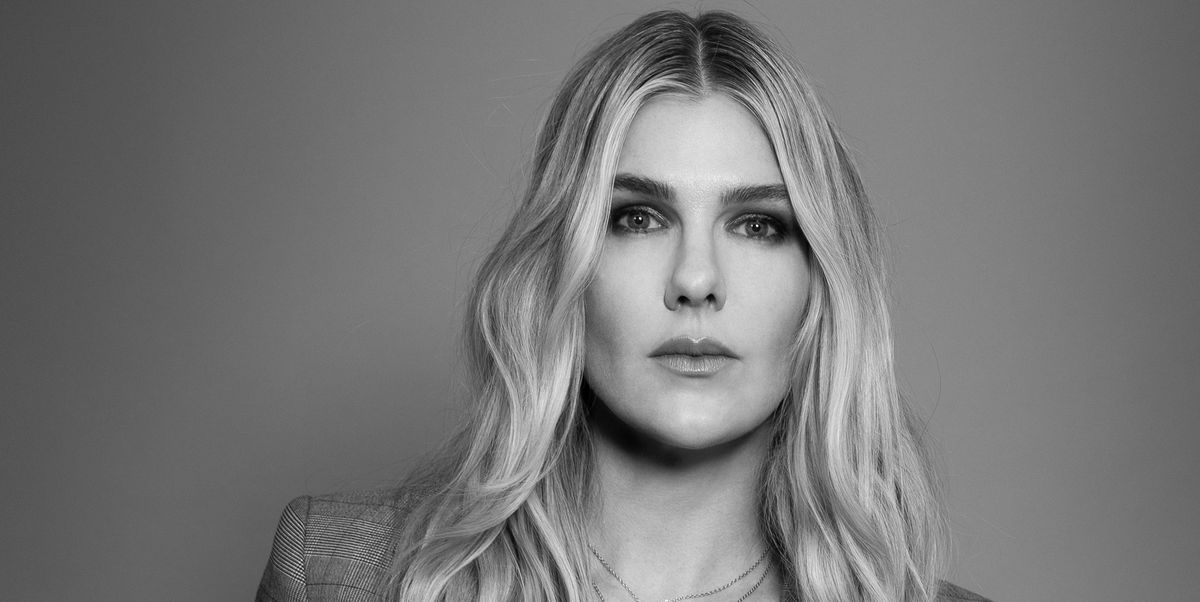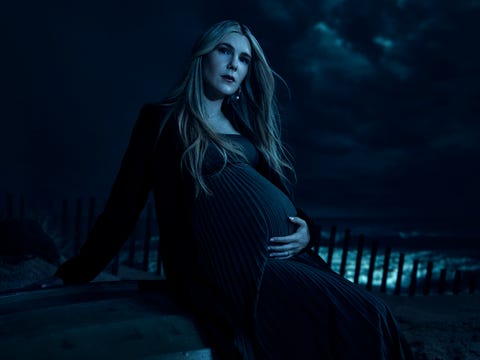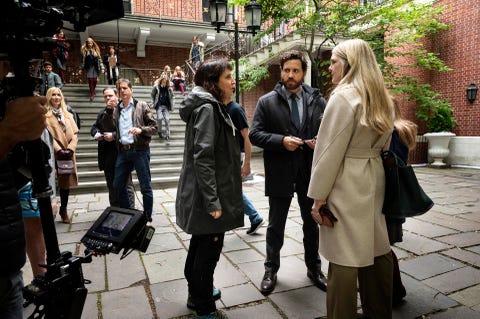The 10th season of American Horror Story has a special meaning for Lily Rabe. The New York-born actress has been part of the hit FX anthology from the beginning, appearing in all but one installment. This new chapter, subtitled Double Tide, gives her the chance to play two characters in one season. Episode 5 of “Part I: Red Tide,” in which she plays a mother in crisis and shows the terrifying original meaning of the recent buzzword “gaslight,” is one of her favorite AHS episodes of all time.
When asked how it feels to reach a decade of AHS, Rabe acknowledges the milestone moment for television’s biggest horror series. “For those of us who were there from season 1, it feels poignant in a way, for sure. I really loved making this season, and so many of the themes that were explored.”
The past calendar year has also seen a streak of roles in critically acclaimed limited series, with Rabe working with hit producer David E. Kelley (The Undoing) and acclaimed director Barry Jenkins (The Underground Railroad). She’s next set to appear in the highly-anticipated political miniseries First Ladies, and the HBO Max thriller Love and Death, based on a real-life murder.
Her favorite part of acting in miniseries? “To get to walk into and through and alongside these completely different worlds. I’m really enjoying it, and I feel so lucky to be working with the creators and directors who are telling the stories,” she says.
Rabe talks to ELLE.com about the terror behind gaslighting, choosing her roles, and going back to basics in AHS: Double Feature.
In a previous interview, you said that episode 5 is one of your favorite episodes of your past nine seasons of American Horror Story. Could you expand on why?
Absolutely. I know it’s a funny thing to say something was your favorite when so many horrible things happen to so many people in the course of one episode, but that’s just how we’re able to talk about the show in this world. I think what the episode explores psychologically is one of the most compelling and terrifying ideas, and the episode explored it in such a harrowing, nuanced way. It’s down to the title of the episode [“Gaslight”].
In the world of [AHS], there are a lot of things that are quite heightened, such as vampiric creatures, potential aliens, et cetera, running around. However, this idea of being gaslit, of people you love [and] trust making you doubt your own sense of reality and leading you into a place of questioning your own sanity, turning the world upside down, telling you the sky is not blue, when you’re looking at a blue sky. Of all the hard topics, that’s a truly terrifying one, because it truly could happen to anyone. This idea of having your own sense of what is real manipulated, it’s so, so scary.
The scenes with Ursula (Leslie Grossman) and Alma (Ryan Kiera Armstrong) impacted me the most. They reminded me very much of the classic film Gaslight. People always say that’s the best example of the term, and this is also a very good example.
I agree. The episode was beautifully directed. I think John Gray just was at the absolute top of his game with this episode. The way that there’s a parallel story happening and [how] that was all interwoven was done so deftly and the true horror of [gaslighting] is unbearable. And when one of those people is your own child.
Yeah. Alma is frightening. When she convinces your character Doris to take the pill, which would either optimize your creativity or turn you into a Pale Person [AHS’s mindless vampires], what was going through your mind while acting that scene?
The lead-up to both my character and Sarah [Paulson]’s character taking the pills was done so well, and it’s so earned when they finally do take the pill. The circumstances are very different, but they’re so desperate and so relatable. These two women were the last people who were going to do it for different reasons, but they are truly driven to it.
At that point [Doris] has said no, and there’s the [scene] where she throws a pill and the glass of water across the room and goes out barefoot into the streets with her baby. She is quite literally trying to do anything she can to escape. What’s so devastating about that moment is she’s just handed the pill, and psychologically there is a moment of actual hope for Doris. She has been driven into a corner, she has given up every shred of hope. And in that moment, looking into her daughter’s eyes, no matter what Alma has done, no matter what she saw or didn’t see in the bathroom last night, she’s still her child, she’s still her heart.
I think there is hope that she can be with them, and also this little flicker of possibility. We all know after watching the first four episodes, she has tremendous insecurity about her own talent and [if she has a] purpose beyond her family. In that moment, the manipulation that happens is so relatable because this person that she loves more than anything in the world, who is such a great talent, is looking at her and saying, I believe in you. For just a flicker of a second, she thinks there is the possibility of something better. Maybe I do have a way out, I can get to the other side of something and be with my family again. We’re so willful. If there is even a crack of light, the sliver of hope, that is what you go towards. In that moment, it’s such a flash, but it is hope.
This 10th season seems like a full circle moment for you in terms of your characters—you’re going back to playing another very devoted mother to, let’s say, a troubled child [like Nora Montgomery in Season 1]. Did it feel like you went back to basics this season?
The term “back to basics” does ring true. I do think there was something that a number of us who had had done the show for many years felt. I hadn’t used that term, but I’ll take it from you—“back to basics,” in that there is real intimacy particularly in this first half of the season with a family dealing with tremendous crisis. And [it’s] certainly going full circle to being driven by a mother’s love, a very different mother to a very different child. I do feel connected to Season 1. There’s nothing similar between those two characters or the children, but I know what you’re saying in terms of that intimacy. That heart of the season is really palpable as a driving force, this family going into this incredibly complicated situation and trying to hold onto one another.
I also wanted to mention your work outside of AHS. Your roles this year have just been so great, with The Undoing, Underground Railroad, and you have another one coming up, First Ladies. Have you started preparing for that?
I just wrapped that, actually. I’m about to start shooting something for HBO Max, another limited series called Love and Death. All four of those jobs, the two that you mentioned, and then the two that I’m sort of between right now, are all limited series. You can get very spoiled having such a wonderful leader [like Ryan Murphy]. So I’m so grateful that I’ve been able to work with these other incredibly brilliant leaders like Barry Jenkins [and] Susanne Bier. I’m so excited to go back and work with David E. Kelley and Lesli Linka Glatter, who I wanted to work with for such a long time.
I think the limited series structure is a real gift to an actor, because it’s this wonderful hybrid between getting to make a movie and a television show. Ryan broke the mold with [AHS], because even though it’s an ongoing series, it also has this feeling of a limited series because you get to have a beginning, middle, and end each season and with each character that you play. I really relish the opportunity to tell these stories with these visionaries, whether it’s seven episodes, eight or 10 or 12. The world-building around a limited series is something that I find so exciting as an actor walking into that world.
Even after AHS where you push yourself to horror extremes, it’s interesting to see the roles you’ve chosen. What would you say is your driving force for choosing roles after going as big and excessive as AHS?
I think it’s changed over time. I used to feel like if I loved a role, if I loved a script, I would want to do it in a vacuum. Now, the first thing is, who is making this? Whose brain created this world? Whose ship am I getting on? Listen, I love to relax, take a vacation, lay on the beach, read a book, and have a day of doing nothing. That’s an actual dream to me, but that’s not something I tend to look for in my work.
In the world of horror period, and the world of AHS, the roof is blown off in terms of what the limits are. That’s not a requirement, but I, but for me as an actor, I want to feel like there is going to be a great sense of freedom because the ground is solid beneath you. So there is room for you to do your work, and to not only surprise yourself, but continue to be surprised by everyone you’re working with. That is the journey that’s so exciting to me. If I know going in, “Oh, this is very clear to me exactly what this experience is going to be, I know exactly what to expect,” that’s probably something that’s less and less interesting to me.
This interview has been edited and condensed for clarity.
This content is created and maintained by a third party, and imported onto this page to help users provide their email addresses. You may be able to find more information about this and similar content at piano.io


